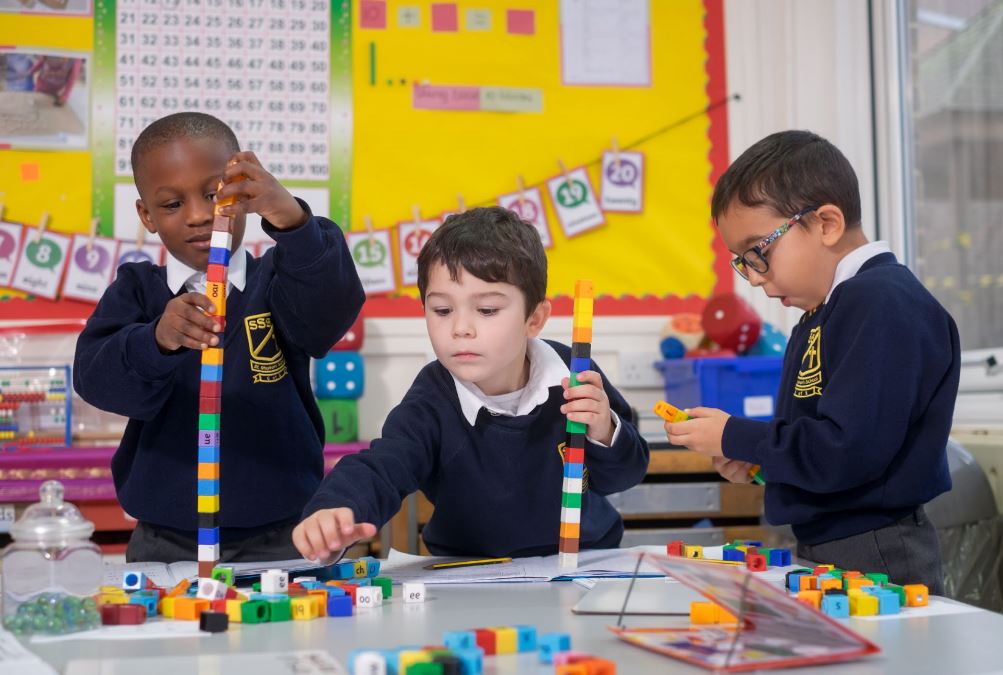Whole School
Maths Intent, Implementation and Impact
Intent
 Our intent at St Stephens is to succeed in children engaging and enjoying mathematics explicitly enough, for them to acquire the intended knowledge, skills and coherence, by teaching a rich, balanced and progressive child friendly curriculum. This will include daily lessons, using fluency, reasoning and problem solving, to develop that conceptual understanding and be able to recall and apply their knowledge and understanding with greater accuracy over time.
Our intent at St Stephens is to succeed in children engaging and enjoying mathematics explicitly enough, for them to acquire the intended knowledge, skills and coherence, by teaching a rich, balanced and progressive child friendly curriculum. This will include daily lessons, using fluency, reasoning and problem solving, to develop that conceptual understanding and be able to recall and apply their knowledge and understanding with greater accuracy over time.
We are working on the curriculum to offer such challenges and fun that will develop more interest in the learning of mathematics, hence greater chances of children developing conceptual, procedural and metacognitive understanding of mathematics. Our policies, resources and schemes, will support the school vision, and will clearly outline a logical and systematically progression of mathematics, across the school.
Implementation
 In addition to implementing the NC statutory for maths, by using the Hamilton Trust maths-planning scheme, we carefully planned: weekly lessons and termly overview; adapted tasks to meet the needs of all children; challenge pupils to deepen their understanding and confidence in mathematics and make adequate provision SEND, disadvantage and EAL pupils. We support this scheme with additional resources such as White Rose, NRICH, Classroom secrets, to develop further learning and consolidation, especially in their reasoning and problem solving skills. Planning facilitates adequate coverage throughout each half term with clear continuity and progression. Daily lessons include fluency, reasoning and problem solving, that include a mental maths and times table focus. Vocabulary, consistent with the national curriculum, is explicitly taught and use by the children in written outcomes and by discussions.
In addition to implementing the NC statutory for maths, by using the Hamilton Trust maths-planning scheme, we carefully planned: weekly lessons and termly overview; adapted tasks to meet the needs of all children; challenge pupils to deepen their understanding and confidence in mathematics and make adequate provision SEND, disadvantage and EAL pupils. We support this scheme with additional resources such as White Rose, NRICH, Classroom secrets, to develop further learning and consolidation, especially in their reasoning and problem solving skills. Planning facilitates adequate coverage throughout each half term with clear continuity and progression. Daily lessons include fluency, reasoning and problem solving, that include a mental maths and times table focus. Vocabulary, consistent with the national curriculum, is explicitly taught and use by the children in written outcomes and by discussions.
We also cover a wide range of maths activities and supports that includes modelling, dual-coding, scaffolding; maths interventions; homework club, early morning maths booster every Tuesdays & Thursdays 7.50 – 8.45 with a range of children from Y2 to Y6. We bought into the online programme ‘Times Table Rock Stars’, where all pupils from Y1 to Y6, have their own log in that they can access at home, either on a laptop, mobile phone or a tablet,. They are able to practice and develop times table skills independently, including playing against each other and challenge themselves to higher levels. The whole school also actively participates annually in - NSPCS number day, world maths day & maths week, where we have an entire day/week focusing on maths games, challenging maths and fun maths.
We aim to accomplish our intentions through our precise sequencing of the curriculum, showing a continual progression across the school; secure high quality teaching; use of effective resources; and translate mathematics through all areas of the curriculum. From each terms assessment, we set interventions for our target children and those that are well below ARE. Whilst all children are challenged, the Greater Depth pupils are extended further with additional resources such as NRICH, Whiterose, Mastery, PMC maths challenge etc. Potential children for Greater Depth are also challenged in class by their teachers, and given the opportunity to work in small groups to access high end and probing questions, in developing their confidence, reasoning and problem solving skills.
Impact
- Maths’s book shows robust coverage and progression with children set next step to consolidate and challenge their knowledge and understanding of mathematics
- Children are able to access tasks, using previous knowledge and independently using maths resources first, before asking for help
- Children are more excited in mathematics and enjoying the fun it provides, such as maths games, times table competition, and maths challenges.
- Good or excellent results in our KS1 and KS2 SAT’s results where we are doing better than both local and national targets
- Children are able to reason and problem solve, showing their methods, and reasoning subject specific vocabulary.
Here you can download information for help in Maths
-
Maths help EYFS foundation
download_for_offline
download_for_offlineMaths help EYFS foundation
- Maths help KS1 download_for_offline
download_for_offlineMaths help KS1
- Maths help KS2 download_for_offline
download_for_offlineMaths help KS2
- MathsCurriculum ks1 download_for_offline
download_for_offlineMathsCurriculum ks1
- MathsCurriculum Lower KS2 download_for_offline
↑download_for_offlineMathsCurriculum Lower KS2
- MathsCurriculum Upper KS2 download_for_offline
download_for_offlineMathsCurriculum Upper KS2
- Mental Skills Year 1 - 5 for Math Tab download_for_offline
download_for_offlineMental Skills Year 1 - 5 for Math Tab
DFE MATH GUIDANCE
- Maths help KS1 download_for_offline




